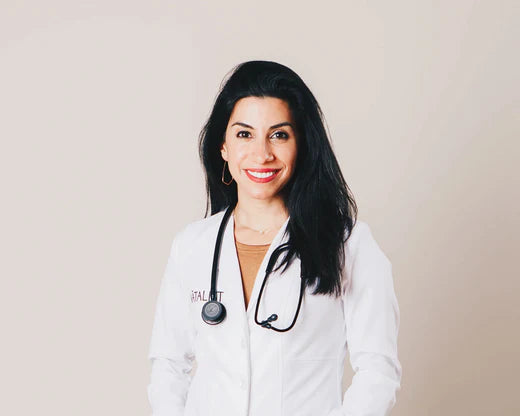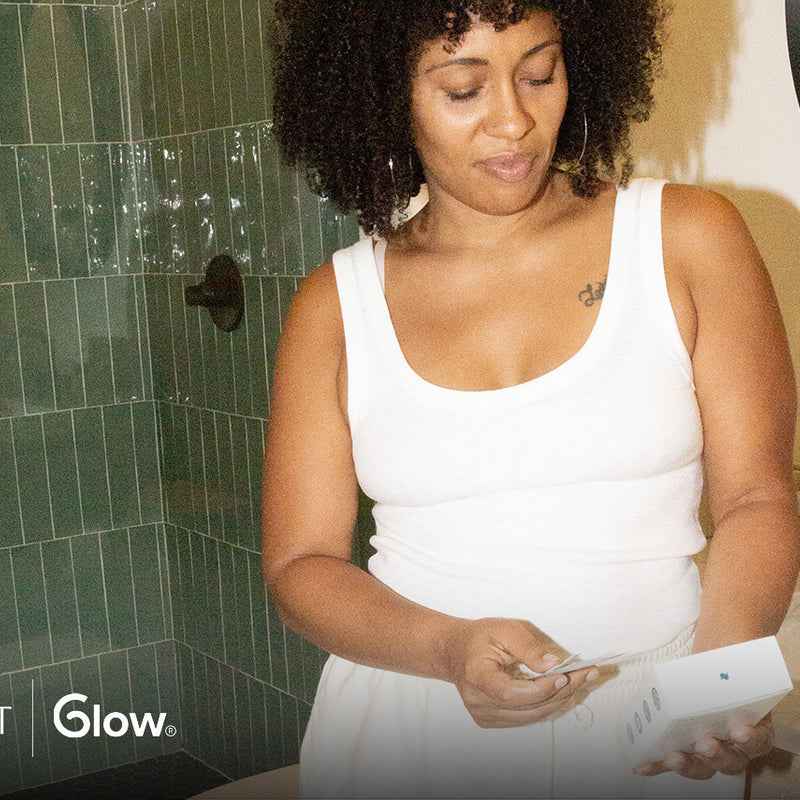How Age Affects Fertility and Pregnancy

Wondering how age of the mom and dad affects fertility? Trying to conceive in your 30s, 40s, or 50s? We created this guide to explain how age affects your chances of pregnancy.
The National Center for Health Statistics reported that the average age of first birth in the United States rose from 24.9 years in 2000 to 26.3 years in 2014. If you live in a big city on either coast of the United States, that number is likely higher. There are many factors that play into people’s timing and decision to get pregnant and when you choose to start this journey is a very personal one.
At age 35 and older, women who become pregnant are given the term of “advanced maternal age” by the medical community. Don’t let this term scare you! It’s important to acknowledge the biological differences in conceiving at various ages, and it’s equally important to remember that it’s still possible to get pregnant in your 30s and 40s (and even early 50s under some unique circumstances). And, there are considerations to keep in mind. Here, we’ll walk you through how age affects female and male fertility and a few things to be aware of during conception and pregnancy.
Age and its affect on fertility
How exactly does age affect fertility? Let’s set the background first. Women are born with a finite number of eggs. In fact, a woman has the most eggs she’ll ever have in her life when she is still a fetus in the womb (6-7 million follicles!). Over a woman’s lifetime, the total number of eggs and the quality of those eggs decrease; the decrease is more rapid starting in the mid-thirties and concludes with menopause, the permanent end of female fertility. This is where the term “advanced maternal age” is used to acknowledge that the decreased quality increases the chance of genetic defects or chromosomal abnormalities, miscarriage, and pregnancies occurring outside of the uterus (ectopic pregnancy). Advanced age in women can also raise the risk profile of the pregnancy. We’ll elaborate on those risks and what you can do to mitigate them below.
Aging affects male fertility as well, especially in men over age 50, although not to the extent that it does female fertility. Men remain fertile throughout their entire lifetimes—in part because their bodies develop sperm constantly, rather than being born with all the sperm they’ll ever have. Data has shown that sperm from older men can cause an increase in chromosomal abnormalities, but the risk is considerably less than the risk attributed to advanced maternal age.
Fertility by the numbers
Let’s talk through the numbers—take a look at the chart below, too, to get a sense of when and to what extent fertility decreases as women age.
From the mid-30s onward, female fertility decreases and the risk of complications during pregnancy increases. Women in their late 30s are about half as fertile as women in their early 20s.
For a healthy woman in her 20s or early 30s, the chances of conceiving each month are 25%-30%. But by the time a woman is 40 years old, the chances are about 10% (or less) each month.
Problems with female fertility increase over time for other complex and highly individualized reasons—it’s not as simple as just having fewer eggs. As people age, they are more likely to develop other medical conditions, like high blood pressure, diabetes, or heart problems, that can affect fertility potential and pregnancy outcomes. A preconception visit gives you the opportunity to review the full picture of your health with your doctor to see if there are any concerning red flags.
What does this mean for me?
If you’re 35 and older and are having difficulty getting pregnant (i.e, you’ve tried for 6 months), please reach out to your doctor and start a conversation. Your doctor can refer you to a reproductive endocrinologist and infertility specialist (REI). An REI specialist can get a sense of your ovarian reserve --a term that takes into account that a woman’s ability to get pregnant is determined by the number and quality of her eggs--through blood work and ultrasound imaging of the ovaries. This may happen through the following:
1) Antral Follicle Count: This one is pretty easy to picture, although you can’t do it at home. Your doctor uses an ultrasound to look at your ovaries, and she will count the follicles—basically, the immature eggs that are still candidates for your monthly ovulation (or assisted reproduction, if you take that route).
2) Anti-Müllerian Hormone (AMH) Test: Cells inside your follicles create AMH, and your doctor orders this test to check the level of AMH in your body. High AMH means lots of follicles, or potential eggs, and low AMH indicates fewer follicles. Anti-mullerian hormone reflects the size of your primordial follicle pool. Understandably, it decreases with age and is undetectable in menopause. Women with known infertility, cancer patients, and patients who have had significant injury to their ovary from radiation or surgery can have lower than expected AMH levels.
AMH, in combination with other hormones like estradiol and follicle-stimulating hormone, are used to predict response rates to assisted reproductive technology. How are these used? If you are undergoing IVF, your doctor will order an Anti-Mullerian Hormone (AMH) or Follicle Stimulating Hormone (FSH) test to determine the amount of hormones you will need to stimulate your ovaries to mature multiple eggs at once and how many eggs you are likely to produce in response to those hormones.
Shouldn’t we all want to know what our AMH levels are before trying to get pregnant? Not necessarily. Multiple research studies show ovarian reserve tests don't correlate with a woman's ability to get pregnant spontaneously within a year. Out of the context of being used by a trained specialist in the field of infertility, these test results can lead to unnecessary stress or, worst yet, false reassurance. When trying to figure out what testing you may need, we recommend sitting down and talking to your doctor.
AMH is not accurate in predicting live births and shouldn’t be used to determine your chances of getting pregnant spontaneously, even if you’re older than 35.
We recommend talking to your doctor at your preconception visit; based on your history and cycles, they can advise you on next steps.
Advanced maternal age pregnancy risks
According to the National Center for Health Statistics, the fastest growing group of women having children are in their 40s—and the vast majority have happy, healthy pregnancies and births. That being said, “advanced maternal age” does increase the risk of the pregnancy. Doctors sometimes even use the term “high-risk pregnancy” for pregnancies in which the woman fits certain conditions, including being over age 35 (or under age 17). Those risks manifest in a few different ways.
Miscarriage, or loss of a pregnancy during gestation, also has a direct relationship with maternal age. In one study of over 420,000 pregnancies, the risk of miscarriage was lowest at about 10% in women age 25 to 34 years, and it steadily rose. For women 35 to 39, the risk was about 20%; 40 to 44 years, the risk was 33%. The miscarriage risk was highest, at about 60%, for women age 45 and older.

Miscarriage Rate by Age of the Mother. Source.
The likelihood of babies being born with birth defects, including chromosomal abnormalities, also increases as women age. The predicted odds for a woman having a child with a Down syndrome diagnosis at birth goes from 1 in 1,300 women at age 25 to about 1 in 30 to 100 women at age 40.
Women who are older than 35 are also more likely to develop diabetes and blood pressure disorders in pregnancy (like gestational hypertension or preeclampsia), or give birth to underweight babies, which results from the placenta not working properly. As a result of these factors and others, they need extra monitoring during pregnancy and may require medical interventions in labor, such as induction.
Minimizing those risks
There are steps that couples can take to respond to those risks when trying to get pregnant. The most important step to help minimize the risks that come with advanced maternal age is to set up a preconception visit with your doctor to discuss your current health, timeline for trying to conceive, and possible blood work. We’ve also compiled some tips for you to consider before you start getting pregnant. In a nutshell, they’re about self-care, and they include guidelines about diet, exercise, BMI, and more.
Once pregnant, couples can elect to undergo genetic screening (to calculate a probability of risk) with a blood test or diagnostic testing (more definitive assessment of risk), which comes in a few different forms—some minimally invasive, like blood testing, and others more invasive, such as amniocentesis, to address the risk of genetic conditions.
The bottom line
Let’s take a moment to pause: the information in this article isn’t meant to discourage anyone from trying to get pregnant. From a biological standpoint, it’s absolutely true that getting pregnant gets more difficult, and the risks increase with age. Our goal is to help shed light on some of these factors to help you understand your body and the decisions you may need to make during your journey to parenthood.
Shop Products From This Article
Get 20% off sitewide with code EARTHDAY at checkout
It’s Mother Earth Month at Natalist! Get 20% off sitewide and help us double our environmental impact. For every pound of plastic sold this month, we’re facilitating the removal of twice the amount of plastic from nature.
Shop Now




















